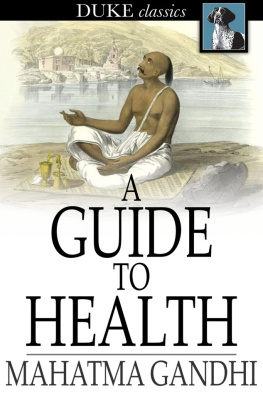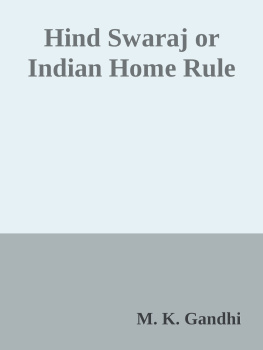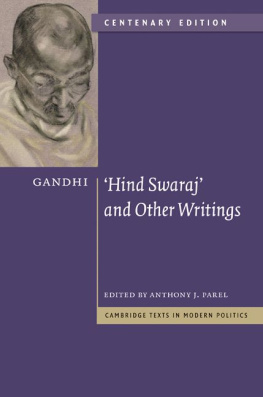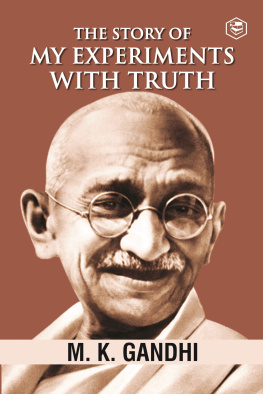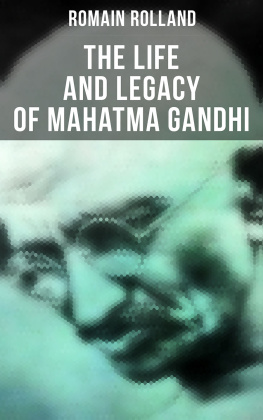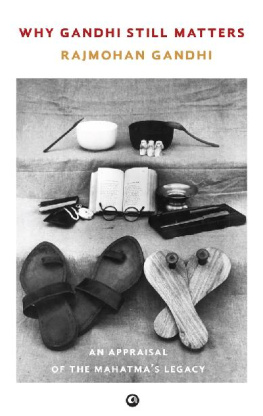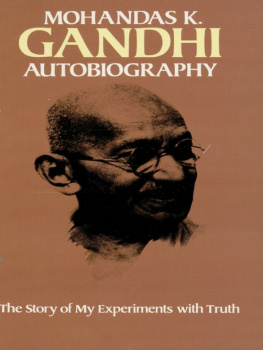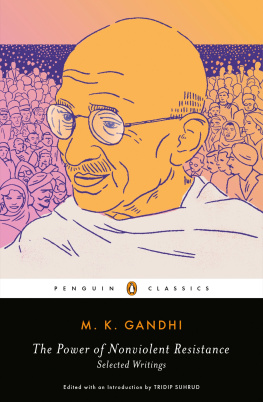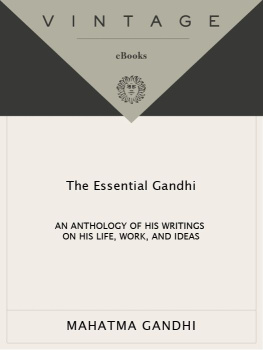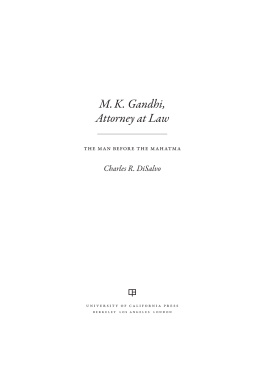Mahatma Gandhi - A Guide to Health
Here you can read online Mahatma Gandhi - A Guide to Health full text of the book (entire story) in english for free. Download pdf and epub, get meaning, cover and reviews about this ebook. year: 2014, publisher: Duke Classics, genre: Science. Description of the work, (preface) as well as reviews are available. Best literature library LitArk.com created for fans of good reading and offers a wide selection of genres:
Romance novel
Science fiction
Adventure
Detective
Science
History
Home and family
Prose
Art
Politics
Computer
Non-fiction
Religion
Business
Children
Humor
Choose a favorite category and find really read worthwhile books. Enjoy immersion in the world of imagination, feel the emotions of the characters or learn something new for yourself, make an fascinating discovery.
- Book:A Guide to Health
- Author:
- Publisher:Duke Classics
- Genre:
- Year:2014
- Rating:5 / 5
- Favourites:Add to favourites
- Your mark:
- 100
- 1
- 2
- 3
- 4
- 5
A Guide to Health: summary, description and annotation
We offer to read an annotation, description, summary or preface (depends on what the author of the book "A Guide to Health" wrote himself). If you haven't found the necessary information about the book — write in the comments, we will try to find it.
Though he is best remembered as the civil rights leader whose nonviolent protests called attention to a number of important issues, including the negative consequences of British imperialism, Mahatma Gandhi was an ascetic person who strove to maintain health and purity. A Guide to Health sets forth his beliefs and practices related to a wide range of health and wellness issues, ranging from diet to exercise to sexual activity.
A Guide to Health — read online for free the complete book (whole text) full work
Below is the text of the book, divided by pages. System saving the place of the last page read, allows you to conveniently read the book "A Guide to Health" online for free, without having to search again every time where you left off. Put a bookmark, and you can go to the page where you finished reading at any time.
Font size:
Interval:
Bookmark:

First published in 1921
ISBN 978-1-62013-827-4
Duke Classics
2014 Duke Classics and its licensors. All rights reserved.
While every effort has been used to ensure the accuracy and reliability of the information contained in this edition, Duke Classics does not assume liability or responsibility for any errors or omissions in this book. Duke Classics does not accept responsibility for loss suffered as a result of reliance upon the accuracy or currency of information contained in this book.
In these days when the name of Mahatma Gandhi is identified with themomentous question of Non-Co-operation, it may come with a shock ofsurprise to most readers to be told that he is something of an authorityon matters of Health and Disease as well. Very few of us perhaps areaware that he is the author of quite an original little Health-book inGujarati. Those who think of him as a dreamy idealist or an unpracticalvisionary, with his head always in the clouds, will certainly beundeceived when they read this book replete from cover to cover withpractical observations on the most practical question of Health. Hisviews are of course radically different from the ordinary views thatfind expression in the pages of such books; in many cases, indeed, hisdoctrines must be pronounced revolutionary, and will doubtless beregarded by a certain class of readers as wholly impracticable. Even themost revolutionary of his doctrines, however, are based, not on theshifting quicksands of mere theory, but on the solid foundation of deepstudy, backed up by personal experience of nearly thirty years. Hehimself recognises that many of his views will hardly be accepted by theordinary reader, but he has felt himself impelled by a stern sense ofduty to give publicity to his convictions formed after so much of studyand experience. Some at least however, of those who read his book cannothelp being profoundly influenced by it. Such, at any rate, has been thecase with me; and I have ventured to translate the book into English inthe hope that others may also be benefitted likewise.
I should perhaps explain that I am not a student of Gujarati, thelanguage of the original. I have used instead one of the two Hindiversions of the book. I should also point out that I have not attempteda literal or close translation, but only a very free rendering intoEnglish. In some cases, whole passages have been omitted; andoccasionally only the general sense of a passage has been given. It ishoped, however, that, in no single instance has there been amisinterpretation of the original words.
I am aware that many errors might have crept in, as the translation hadto be done in a hurry, and there was hardly anytime for revision. I hopeto make a thorough revision of the book, in case a second edition iscalled for.
A. Rama Iyer.
National College,
Trichinopoly,
July 1921.
For more than twenty years past I have been paying special attention tothe question of Health. While in England, I had to make my ownarrangements for food and drink, and I can say, therefore, that myexperience is quite reliable. I have arrived at certain definiteconclusions from that experience, and I now set them down for thebenefit of my readers.
As the familiar saying goes, 'Prevention is better than cure.' It is fareasier and safer to prevent illness by the observance of the laws ofhealth than to set about curing the illness which has been brought on byour own ignorance and carelessness. Hence it is the duty of allthoughtful men to understand aright the laws of health, and the objectof the following pages is to give an account of these laws. We shallalso consider the best methods of cure for some of the most commondiseases.
As Milton says, the mind can make a hell of heaven or a heaven of hell.So heaven is not somewhere above the clouds, and hell somewhereunderneath the earth! We have this same idea expressed in the Sanskritsaying, Mana va Manushayanm Kranam Bandha Mokshayohman's captivityor freedom is dependant on the state of his mind. From this it followsthat whether a man is healthy or unhealthy depends on himself. Illnessis the result not only of our actions but also of our thoughts. As hasbeen said by a famous doctor, more people die for fear of diseases likesmall-pox, cholera and plague than out of those diseases themselves.
Ignorance is one of the root-causes of disease. Very often we getbewildered at the most ordinary diseases out of sheer ignorance, and inour anxiety to get better, we simply make matters worse. Our ignoranceof the most elementary laws of health leads us to adopt wrong remediesor drives us into the hands of the veriest quacks. How strange (and yethow true) it is that we know much less about things near at hand thanthings at a distance. We know hardly anything of our own village, but wecan give by rote the names of the rivers and mountains of England! Wetake so much trouble to learn the names of the stars in the sky, whilewe hardly think it worth while to know the things that are in our ownhomes! We never care a jot for the splendid pageantry of Nature beforeour very eyes, while we are so anxious to witness the puerile mummeriesof the theatre! And in the same way, we are not ashamed to be ignorantof the structure of our body, of the way in which the bones and muscles,grow, how the blood circulates and is rendered impure, how we areaffected by evil thoughts and passions, how our mind travels overillimitable spaces and times while the body is at rest, and so on. Thereis nothing so closely connected with us as our body, but there is alsonothing perhaps of which our ignorance is so profound, or ourindifference so complete.
It is the duty of every one of us to get over this indifference.Everyone should regard it as his bounden duty to know something of thefundamental facts concerning his body. This kind of instruction shouldindeed be made compulsory in our schools. At present, we know not how todeal with the most ordinary scalds and wounds; we are helpless if athorn runs into our foot; we are beside ourselves with fright and dismayif we are bitten by an ordinary snake! Indeed, if we consider the depthof our ignorance in such matters, we shall have to hang down our headsin shame. To assert that the average man cannot be expected to knowthese things is simply absurd. The following pages are intended for suchas are willing to learn.
I do not pretend that the facts mentioned by me have not been saidbefore. But my readers will find here in a nutshell the substance ofseveral books on the subject. I have arrived at my conclusions afterstudying these books, and after a series of careful experiments.Moreover, those who are new to this subject will also be saved the riskof being confounded by the conflicting views held by writers of suchbooks. One writer says for instance, that hot water is to be used undercertain circumstances, while another writer says that, exactly under thesame circumstances, cold water is to be used. Conflicting views of thiskind have been carefully considered by me, so that my readers may restassured of the reliability of my own views.
We have got into the habit of calling in a doctor for the most trivialdiseases. Where there is no regular doctor available, we take the adviceof mere quacks. We labour under the fatal delusion that no disease canbe cured without medicine. This has been responsible for more mischiefto mankind than any other evil. It is of course, necessary that ourdiseases should be cured, but they cannot be cured
Font size:
Interval:
Bookmark:
Similar books «A Guide to Health»
Look at similar books to A Guide to Health. We have selected literature similar in name and meaning in the hope of providing readers with more options to find new, interesting, not yet read works.
Discussion, reviews of the book A Guide to Health and just readers' own opinions. Leave your comments, write what you think about the work, its meaning or the main characters. Specify what exactly you liked and what you didn't like, and why you think so.

